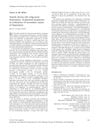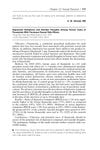 2 citations,
January 2023 in “Research Square (Research Square)”
2 citations,
January 2023 in “Research Square (Research Square)” Managing emotional distress, obesity, insulin resistance, and high male hormones is crucial for improving well-being in women with PCOS.
 10 citations,
January 2017 in “Skin Pharmacology and Physiology”
10 citations,
January 2017 in “Skin Pharmacology and Physiology” Finasteride may cause vitiligo, sexual issues, and depression; better treatments and predicting side effects needed.
[object Object]  January 2013 in “Psychiatry and clinical neurosciences”
January 2013 in “Psychiatry and clinical neurosciences” Physical symptoms in depression can reveal underlying medical conditions.
 82 citations,
August 2006 in “Pharmacology, Biochemistry and Behavior”
82 citations,
August 2006 in “Pharmacology, Biochemistry and Behavior” Certain steroids in the brain affect mood and symptoms of depression, and treatments targeting these steroids show promise for improving these symptoms.
 November 2023 in “L'Endocrinologo”
November 2023 in “L'Endocrinologo” Women with PCOS are more likely to experience sexual dysfunction, but lifestyle changes and weight loss can improve sexual function.
 336 citations,
August 2015 in “European Journal of Epidemiology”
336 citations,
August 2015 in “European Journal of Epidemiology” The Rotterdam Study found risk factors for elderly diseases, links between lifestyle and genetics with health conditions, and aimed to explore new areas like DNA methylation and sensory input effects on brain function.
 1 citations,
April 2019 in “Endokrynologia Polska”
1 citations,
April 2019 in “Endokrynologia Polska” Healthy diet and exercise are important for women with PCOS to manage weight and metabolic issues, and supplements like omega-3, vitamin D, and inositol may help.
 January 2013 in “Yearbook of Urology”
January 2013 in “Yearbook of Urology” Former finasteride users showed higher rates of depression and suicidal thoughts compared to those who never used it.
 59 citations,
November 2018 in “Psychoneuroendocrinology”
59 citations,
November 2018 in “Psychoneuroendocrinology” Lower levels of certain brain chemicals are linked to worse PTSD symptoms in men.
 15 citations,
September 2014 in “JAMA Dermatology”
15 citations,
September 2014 in “JAMA Dermatology”  2 citations,
December 2019 in “Neurobiology of Stress”
2 citations,
December 2019 in “Neurobiology of Stress” Changing allopregnanolone levels in baby rats affects their adult behavior and alcohol use.
 33 citations,
December 2015 in “Neuroendocrinology”
33 citations,
December 2015 in “Neuroendocrinology” Finasteride treatment changes brain steroid levels and receptors, affecting brain function even after stopping treatment.
 26 citations,
January 2020 in “Przegląd Menopauzalny”
26 citations,
January 2020 in “Przegląd Menopauzalny” Menopausal women have higher androgen levels, which can cause symptoms like facial hair growth and low sexual desire.
 10 citations,
January 2012 in “International Journal of Trichology”
10 citations,
January 2012 in “International Journal of Trichology” The study found no link between anxiety, vitamin B12, folate, TSH, ferritin, zinc levels, and trichodynia in telogen alopecia patients.
 110 citations,
August 2015 in “Neuropsychopharmacology”
110 citations,
August 2015 in “Neuropsychopharmacology” High-dose dutasteride reduces PMDD symptoms by stabilizing neurosteroid levels.
 May 2024 in “Journal of drug delivery and therapeutics”
May 2024 in “Journal of drug delivery and therapeutics” Women with PCOS have higher oxidative stress and hormone imbalances, suggesting managing oxidative stress could help.
 40 citations,
November 2011 in “American Journal of Human Biology”
40 citations,
November 2011 in “American Journal of Human Biology” Stress from being transgender is linked to higher blood pressure at night and more inflammation, which may affect heart health.
 20 citations,
June 2015 in “Hormone Molecular Biology and Clinical Investigation”
20 citations,
June 2015 in “Hormone Molecular Biology and Clinical Investigation” Finasteride worsens erectile dysfunction and lowers testosterone in men with enlarged prostates, unlike tamsulosin.
 134 citations,
August 2012 in “The Journal of Clinical Psychiatry”
134 citations,
August 2012 in “The Journal of Clinical Psychiatry” Former finasteride users with persistent sexual side effects have higher rates of depression and suicidal thoughts.
1 citations,
May 2024 in “Journal of Clinical Medicine” Depression and skin autoimmune diseases are linked, needing combined care for better treatment.
November 2021 in “Frontiers in Genetics” The FAW-FS algorithm improves depression recognition, and psychological interventions help AGA patients' mental health.
 5 citations,
April 2021 in “Journal of Endocrinological Investigation”
5 citations,
April 2021 in “Journal of Endocrinological Investigation” Higher DHT levels are linked to fewer hypogonadism symptoms in men with normal testosterone levels.
[object Object]  2 citations,
September 2015 in “Journal of the Egyptian Women's Dermatologic Society (Print)”
2 citations,
September 2015 in “Journal of the Egyptian Women's Dermatologic Society (Print)” People with psoriasis and depression have lower BDNF levels, which could help measure depression in those with psoriasis.
 July 2022 in “Research Square (Research Square)”
July 2022 in “Research Square (Research Square)” Hair analysis can somewhat track past testosterone levels but is influenced by factors like hair washing, growth rate, sex, and hair color.
 14 citations,
January 2020 in “International Journal of Biological Sciences”
14 citations,
January 2020 in “International Journal of Biological Sciences” Ranitidine and finasteride lower TMAO levels, reducing heart and kidney damage by changing gut bacteria.
 9 citations,
December 2014 in “Neuropsychiatric Disease and Treatment”
9 citations,
December 2014 in “Neuropsychiatric Disease and Treatment” People with first-time vitiligo have lower levels of a certain brain protein compared to healthy individuals.

Certain gene variations and different levels of BDNF and CRH hormones are linked to vitiligo.
11 citations,
November 2021 in “International journal of molecular sciences” Gut microbes significantly affect brain steroid levels.
 6 citations,
August 2009 in “Mini-reviews in Medicinal Chemistry”
6 citations,
August 2009 in “Mini-reviews in Medicinal Chemistry” Different drugs can treat high male hormone levels in women, but they have various effects and some may harm a fetus.

























